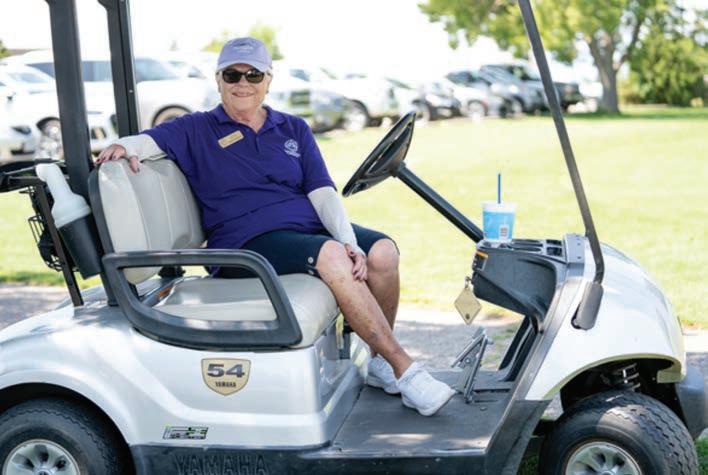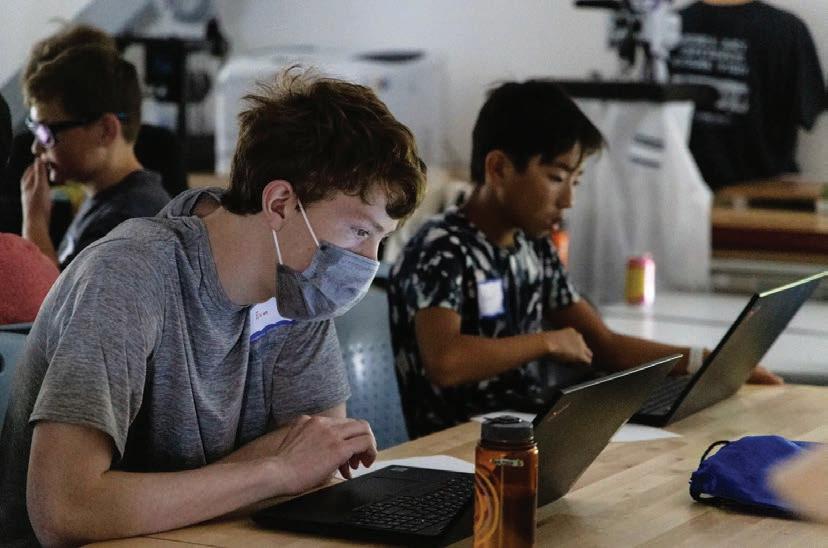
7 minute read
WAITLIST
of cherry-picking states for comparison purposes that made Colorado look better.
Medicaid o cials said autism therapists, along with many other medical and mental health providers, are struggling now because of a huge swing in the wage market.
“Health care workers have really been through a tough time over the last several years and we’ve had individuals leave the workforce,”
Kim Bimestefer, executive direc- teaching, and the stable income that comes with it was more appealing.
DeSantis started certi cation from the Ladies Professional Golf Association. In order to do that, she needed to work at least part- tor of the Colorado Department of Health Care Policy and Financing, which includes the Medicaid division, told e Sun. “ e wage rates for health care workers have gone up in an unprecedented way and that’s sometimes putting pressure on organizations who are passionately trying to provide care to their customers, their patients.” time at a golf course to gain experience and earn no less than an associate’s degree in a business–related eld. So she got to work.
Bimestefer pointed toward $26 million in recent investments by the legislature and Gov. Jared Polis to bolster the health care workforce, including free college and retention programs for industries including nursing, EMTs, and dental and pharmacy technicians.
Beginning as a part-time instructor at Springhill Golf Course in 1980, where DeSantis teaches today, she had to work nights as a server at Red Lobster to supplement her income. All the while, she went to Pickens Technical Institute in Aurora to get her associate’s degree in management of
“It was a struggle, but I was pretty young,” DeSantis said. “Teaching just became my outlet. When I was on the lesson tee, I was in my own
Helping people solve a problem with a swing or a putt was as satisfying as her own personal wins.
By 1984, she was o cially an LPGA Pro.
While she was working toward her LPGA Pro certi cation at Meadow Hills Golf Course — where she worked for a few years between stints at Springhill — DeSantis noticed the virtual dearth of female players. Tee times were dominated by men, especially on weekends when working women
Complaints that Medicaid provider rates are too low are a recurring dialogue in Colorado, extending across various rate categories from primary care to mental health. e Medicaid division also has faced harsh, public criticism in the past year over delays in approving prior authorization requests for children with disabilities.
Bimestefer said concerns about rates grow louder when the rate review committee is about to meet.
“You’ll see the voices of various stakeholders get louder because this is their time to voice their concerns and to in uence policy,” she said.
“ e department is listening. We’re listening to providers. We’re listening to families. We’re looking at other states.” erapists met with Medicaid ofcials in December 2022 and again in February, seeking to stave o the had time o , too, and could theoretically take tee times of their own.
Autism therapy providers have seen their operational costs increase 42% since 2019, while rates have gone up just 7.4%, according to their analysis.
“ is has forced small, local business owners like myself to cut our own pay or skip our own payroll as well as cut much-needed expenses that impact the quality of services we deliver,” said Rebecca Urbano Powell, executive director of Seven Dimensions Behavioral Health in Evergreen.

She wanted to see more women in golf, so she decided to take action.
DeSantis came up with a proposal to the then Head PGA Pro of Meadow Hills, Mickey Byrne: come up with a program encouraging women to learn the game, socialize, have fun and, ultimately, compete.
Byrne was all for it. After he and DeSantis got the OK from the City of Aurora’s manager of golf, Dennis Lyon, the Working Women’s program was up and running in 1984.
In its inaugural season, there were about 45 members. By the second season, it exploded to more than 100 members. With the boost in popularity and a novel idea, Aurora Hills Golf Course o ered their course to the group.
Today, more than 150 Working Women rotate rounds between all ve Aurora city golf courses every weekend, backed by the Colorado Women’s Golf Association.
Over time, DeSantis realized the
SEE GOLF, P21
closures. ey also met with the legislature’s Joint Budget Committee. “Because of how slow this process has been with (the Medicaid department), providers are going further into debt,” Powell said.
Winn, who is also founder of Advanced Behavioral Resources, said his nonpro t is concerned about how the therapy providers who stay open in Colorado will take on the estimated 1,000 children with autism whose autism centers have closed. e state is down to 136 providers billing Medicaid for pediatric behavioral therapy for kids with autism, a number that is dropping, according to the providers’ analysis.
“For years, this issue has been festering,” Winn said. “We have been having conversations with (the Medicaid department) and no one seems to be able to x the issue.
“ ey are hands down the most vulnerable Coloradans, who can’t speak for themselves. ey need a voice.” is story is from e Colorado Sun, a journalist-owned news outlet based in Denver and covering the state. For more, and to support e Colorado Sun, visit coloradosun. com. e Colorado Sun is a partner in the Colorado News Conservancy, owner of Colorado Community Media. e ect of bringing more women into golf was about much more than just the game. Many women who came to play were leaders in their industries. Some were bringing clients out to courses to play. Not only were women learning to play golf, but also about the social intricacies of golf that can often drive business connections.
Most important, though, were the friendly, casual relationships on the course that women could make with other women.
“( e social aspect) is very important,” DeSantis said. “ ere’s still to this day so many women that want to go and play with other women, but don’t have an outlet.
So that’s where the Working Women’s (program) came into play. … It kind of expanded and blew up, and now there’s all kinds of ladies groups that you can join.” ough female participation in golf has been growing slowly since DeSantis has been a pro, the COVID-19 pandemic is where it really began to skyrocket. e National Golf Foundation reported that in 2019, there were 5.6 million female golfers. Today, there are 6.4 million, a 15% increase in the female player base in comparison to a 2% increase in male players during that time period.
“Way unexpected,” DeSantis said. “I mean, the lessons went crazy, the rounds went crazy. Most of it was because it was one of the few sports that people could still come out (and play). … I think it introduced a lot of people back into the sport and into the sport.”
She has taught LPGA 101, a beginner’s golf lessons program for women and their families, since its inception in 2019. at’s when she began to work with Dan O’Shaughnessy, who took over as Head PGA Pro at Springhill in 2020.
O’Shaughnessy, whose main goal is to expose the game to as many people as possible, built a dedicated learning area in 2021 for DeSantis and others to teach newcomers. Even though 70-year-old DeSantis retired in 2021, O’Shaughnessy has kept the door open for her to teach on weekends, a nod to the value she brings to the course.
Plus, DeSantis doesn’t think she’ll ever stop wanting to teach.
“I would say Karen is a bit of an anomaly in that she still loves to teach after” 40 years in the business, O’Shaughnessy said. “A lot don’t. … (She’s) passionate about teaching, helping golfers, giving them the tools for starting out. She’s just really good at knowing what to give people and how much to give them, so (students) aren’t overwhelmed.” at passion and knack for teaching is what got Liz Vonau to stick around for a ve-lesson course from DeSantis.
Vonau had a little experience gol ng as a teenager with her father, but she never got into it. Last summer, at 41, she decided to jump back in. She wanted to take up something outdoorsy, and with her father still being an avid golfer, she wanted to be able to do that with him.
One of the only ways to get better at golf is to go out and play a course, but for many new golfers, doing so can be intimidating at rst. According to Vonau, DeSantis has a air for making the learning process more comfortable.
“She really taught you the basics, but then also taught you to not be intimidated,” Vonau said. “It was just like building that con dence of (saying) if you hit well, you don’t need to hit far. (She) really makes you feel like you don’t have to be the best player, you don’t have to be the farthest hitter to go and play and have fun.” is year will be their 40th anni- versary.
A year after taking lessons from DeSantis, Vonau still plays with her dad every week.
Karen said her husband mentored her during her career in golf, as they traveled across the country during winters to play as she got better at the game. Her fondest memories were when she and Carl played golf in Hawaii on two occasions to celebrate anniversaries.
DeSantis said that her proudest accomplishments were earning her LPGA Pro certi cation and becoming the rst assistant golf pro at Springhill when she moved back there from Meadow Hills in 1987.
“To have the opportunity that they gave me was just such a blessing,” DeSantis said. “I’ve never regretted it, I never regretted getting into the LPGA. I’ve been around the city so long that I don’t go somewhere where I don’t meet someone, and they tell me a story.” is Sentinel story via e Associated Press’ Storyshare, of which Colorado Community Media is a member.







